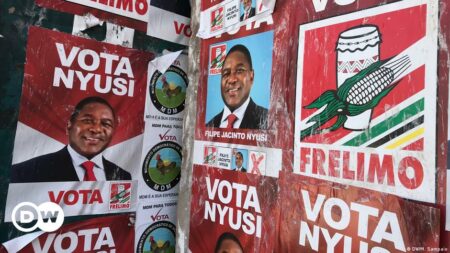Maputo, Mozambique – As Mozambique prepares for its upcoming election on October 9, the political landscape is undergoing significant changes. President Filipe Nyusi, who has been in power since 2015, will not be running as a candidate due to constitutional limits that restrict the president to two consecutive five-year terms.
The ruling party, Frelimo, which has held power since Mozambique’s independence from Portugal in 1975, has selected Daniel Chapo as its presidential nominee. Chapo, a relatively unknown figure in national politics, is currently the governor of the southern Mozambican province of Inhambane. At 47 years old, he is the first Frelimo candidate born post-independence, marking a generational shift within the party.
Chapo holds a law degree and a Master’s in development management. He has served in various political roles, including as an administrator of the districts of Nacala and Palma. Despite his low national profile, Frelimo presents Chapo as a fresh face who they hope will garner significant support from Mozambique’s youth.
“Chapo represents a new era for Frelimo and Mozambique,” said Frelimo’s spokesperson. “His background in development and law, combined with his experience in local governance, positions him well to address the challenges facing our nation.”
The election is set against a backdrop of complex issues, including economic challenges, security concerns, and the ongoing peace process following years of conflict with the opposition group Renamo. Chapo’s candidacy comes at a crucial time as the country seeks to solidify peace and promote economic development.
The opposition parties, including Renamo and the Democratic Movement of Mozambique (MDM), are preparing their campaigns to challenge Frelimo’s long-standing dominance. Renamo’s candidate, Ossufo Momade, emphasises peace and reconciliation, while MDM’s candidate, Daviz Simango, focuses on economic reforms and anti-corruption measures.
Political analysts suggest the October election will be a critical test for Mozambique’s democracy. “This election will not only determine the next president but will also set the tone for Mozambique’s future political stability and development,” said political analyst Joaquim Chissano.
The international community is closely watching the election, with observers from the African Union and the European Union expected to monitor the polls. There are hopes that the election will be free and fair, reflecting the will of the Mozambican people.
As the campaign season intensifies, all eyes will be on Daniel Chapo and how he navigates the challenges ahead. His ability to connect with voters, particularly the younger generation, could play a pivotal role in determining the outcome of the election.
